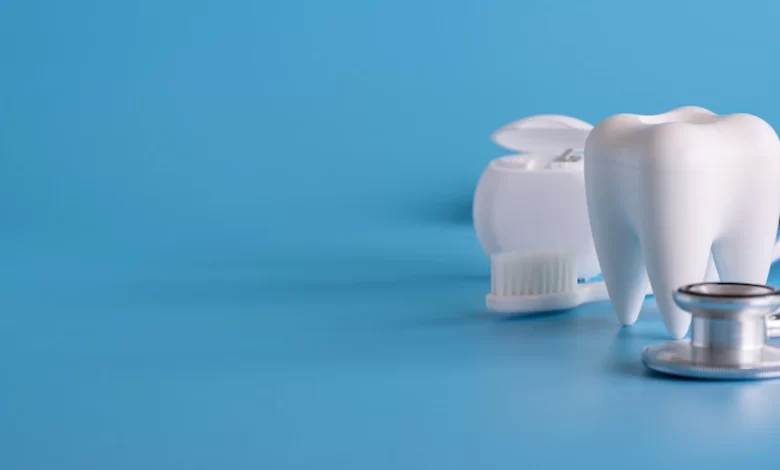Are there any risks to getting a dental implant?

When it comes to replacing missing or damaged adult teeth, dental implants are a very effective option. The operation involves the placement of a metal post into the bone of your jaw in the place of a lost tooth, which your dentist will do. They will then place an artificial tooth on top of the post to make your smile seem more natural-looking. Implants are sturdy enough to endure the usual chewing motions of the mouth.
In most cases, implants are superior to dentures or bridgework when they function properly. Even though they are stronger than removable teeth and typically more pleasant, having dental implants requires several operations and comes with a small risk of problems.
What is the procedure for placing dental implants?
If you are missing one or more teeth and your jaw has reached the end of its growth cycle, your dental practice Cardiff may recommend dental implants. This will provide you with a long-term solution for replacing your lost teeth. Implants have a lengthy lifespan and are practically as robust as natural teeth in terms of strength.
The following are the stages involved in dental implant surgery
Removal of a tooth
You will need time to recuperate after your dentist has extracted a damaged tooth from your mouth. You will then need to wait for the following operation to be performed.
Preparation of the jaw
The dentist will examine you once you have recovered from the extraction to ensure that the bone in your jaw is strong enough to support a dental implant.
You may need a bone transplant to enhance bone density and encourage further bone development. If you do get a transplant, you will have to wait a period before undergoing another treatment.
Implantation of a prosthesis
Implant placement is a surgical operation that takes place in the mouth. Your dentist will perform a surgical procedure to expose the jawbone behind your gums. The metal base of the implant will be inserted into the bone once it has been drilled into it. It may take many months after that for the bone to develop around the implant, allowing it to be secured securely in its new location.
Positioning of the abutment
Your dentist will connect an abutment above your gum line to the implant once it has been integrated with your jawbone for some time. To uncover the impact base, they will open up the skin of your gums and connect a small metal rod to the bottom of your teeth. In certain instances, the abutment and the implant are put at the same time in the same procedure. The rod will ultimately serve as a retainer for your fake tooth.
The installation of artificial teeth
Using the impressions you provide, your dentist will create a crown that is almost indistinguishable from your natural teeth and fits tightly against them. When the crown is finished, the dentist will adhere it to the abutment using dental cement.
What Are the Risks and Consequences of Dental Implants?
Osseointegration has not been successful
When the bone develops around your implant, this is referred to as osseointegration.
Unless the osseointegration process is successful, the implant will not be strong enough to keep the crown in place. Dental implant failure is the term used to describe this situation. It is possible that the implant may come out on its own or that you will need to have it removed in the event of a dental implant failure. You and your dentist may discuss whether you should replace the implant or attempt another alternative if your dental implant is damaged or fails.
Implant location that is not optimal
Your dentist may make a mistake while installing your implant. If there is a difficulty with the placement or angle of the implant, it may result in difficulties. It is possible that the implant may not fuse correctly with the bone, that it will be placed too near to neighbouring teeth and cause discomfort, or that it will become loose or unpleasant. Depending on the circumstances, you may be required to have the implant removed or replaced. You may want to seek a second opinion from a different dentist before having a replacement implant installed.
The following are the risks associated with receiving dental implants
Sinus injury
It is one of the most serious risks associated with dental implants cost Cardiff. Located right underneath your nasal sinuses is your upper jaw. Implants used to replace your upper teeth have the potential to enter into the sinuses, causing pain and even infection in certain cases. If this occurs, your dentist will inform you of the steps you need to take to deal with the condition as soon as possible.
Infection
Dental implant surgery, like any other oral surgical operation, has a risk of developing an infection. Your dentist will provide you with specific advice on how to keep your wounds clean while they heal. If you have any discomfort, swelling, or fluid flowing from the incision site, call your dentist immediately. You may need further treatments to address infection of the gums or bone.
Nerve Damage
The implant procedure may result in nerve injury, which is a risk of the procedure.
Before the operation, your dentist should take X-rays of your mouth to determine where the nerves are located. Because nerve injury might have long-term consequences, you should discuss the risks of the operation with your dentist before doing it.
Improper Implant placement
Implant placement might have an impact on the teeth around the implant in certain situations. If the teeth next to the surgical site have minor issues such as decay or root damage, the trauma from the procedure might exacerbate the situation. Before installing your implant, your dentist should inspect your existing teeth and resolve any issues that may have arisen.
Wrapping Up
Before committing to dental implants, speak with your dentist about all of the hazards involved. Make sure they are aware of any medical ailments you may be suffering from or medications you may be taking. Your dentist will assist you in determining whether or not dental implants are the best choice for you. If you’d like to know about dental implants cost in Cardiff, get in touch with us today.




